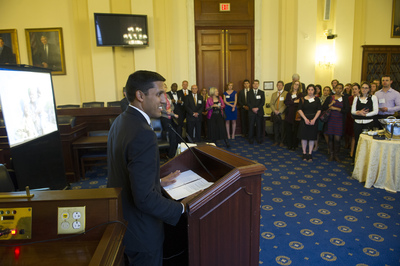WASHINGTON, April 30, 2014 /PRNewswire-USNewswire/ -- Congressional champions joined members of the malaria community to commemorate World Malaria Day at a reception hosted by Malaria No More and other members of the Malaria Roundtable on Tuesday, April 29th.

The event, held in the Veteran's Affairs Committee room of the Cannon House Office Building, highlighted key partnerships in the fight against malaria, including the United States government, endemic countries, scientific community, faith-based organizations and the private and nonprofit sectors. This spirit of collaboration in bringing an end to malaria extends across party lines, illustrated by the bi-partisan co-chairs of the Senate and House Caucuses on Malaria and Neglected Tropical Diseases, and the fact that the President's Malaria Initiative (PMI) - an integral driver of progress in the malaria fight - was founded by President George W. Bush and has been scaled-up significantly by President Barack Obama.
Malaria is a mosquito-borne disease caused by a parasite. Through an expanded global effort to combat the disease, tremendous progress has been made - with an estimated 3.3 million lives saved globally and a 54% decrease in the rate of child malaria deaths since 2000 in Africa, where 90% of malaria deaths occur. Despite progress, malaria still kills a child every minute.
Co-chairs of the Congressional Caucuses Sen. Christopher Coons (D-DE), Sen. Roger Wicker (R-MS), and Rep. Ander Crenshaw (R-FL) were in attendance and made remarks recognizing the U.S. government's contributions to the global effort to defeat malaria; Rep. Gregory Meeks (D-NY) lent his support to the event as a House Caucus co-chair, and several speakers recognized Sen. John Boozman (R-AR) for his long-term support for the malaria cause and wished him a speedy recovery from his recent heart surgery. The event also featured a keynote speech by USAID Administrator Dr. Rajiv Shah, who shared his thoughts on how PMI's successful efforts to reduce malaria deaths can provide a model for the U.S.'s approach to other global health and development issues. "Perhaps the most impressive statistic we've seen is a reduction in all-cause childhood mortality in every single PMI country. I find this astounding. It means that-through one intervention-we are generating a cascade of public health benefits." said Dr. Shah. "But the real story here is about more than the results we've seen-it's about the focused, results-oriented approach that got us here. Today, we have adopted these principles across our work-bringing a new model of development to child survival."
Key to eradicating malaria at a global level is maintaining and growing funding for research and elimination efforts - since 1930, 75 resurgences of malaria have been recorded. Nearly all of the resurgences are linked to the scaling back of programs. Eliminating malaria would also unlock massive financial power within Africa, which is home to several of the world's fastest-growing economies. A recent Accenture study places the global economic benefit of eliminating malaria at more than $208 billion dollars.
Malaria No More is a nonprofit focused on fighting malaria deaths by engaging leaders, rallying the public, and delivering life-saving tools and education to families across Africa.
Contact: Kara Leene
Policy & Advocacy Manager
Malaria No More
646.420.0801
kara.leene@malarianomore.org
Photo - http://photos.prnewswire.com/prnh/20140430/82690
SOURCE Malaria No More
